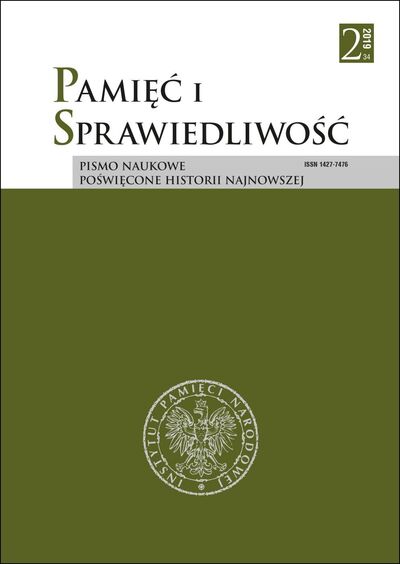The War Situation in North Korea and the Activities of the Embassy of the Republic of Poland in Pyongyang in the Reports of Ambassador Juliusz Burgin (1950–1951)
Remembrance and Justice, Vol. 34 No. 2 (2019), pages: 523-551
Publication date: 2019-12-30
Abstract
Keywords
wojna koreańska • dyplomacja • Korea Północna • Polska • Juliusz Burgin Korean war • diplomacy • North Korea • Poland • Juliusz Burgin
References
Cumings B., The Korean War, New York 2010.
Goncharov S.N., Lewis J.W., Litai X., Uncertain Partners. Stalin, Mao, and the Korean War, Stanford 1993.
Kim Ch. K., The Korean War 1950–1953, Seoul 1980.
Lee Ch.S., Oh K.W., The Russian Faction in North Korea, „Asian Survey” 1968, vol. 8, no. 4.
Łukasiewicz S., Partia, ideologia i wywiad polityczny. Studium funkcjonowania organizacji partyjnej w wywiadzie Ministerstwa Bezpieczeństwa Publicznego, „Pamięć i Sprawiedliwość” 2014, nr 1 (23).
Słownik biograficzny działaczy polskiego ruchu robotniczego, red. F. Tych i inni, t. 1, Warszawa 1978.
Sołtysik Ł., Dzieci i młodzież północnokoreańska na Dolnym Śląsku i Mazowszu w latach 1951–1959, „Śląski Kwartalnik Historyczny Sobotka” 2010, nr 1 (LXV).
Sołtysik Ł., Dzieci i młodzież północnokoreańska w Polsce w latach 1953–1954 w świetle wybranych dokumentów, „Rocznik Jeleniogorski” 2009, nr 41.
Stueck W., Rethinking the Korean war: a new diplomatic and strategic history, Princeton 2002.
Stueck W., The Korean War. An International History, Princeton 1995.
Szyc S., „Niech żyje przyjaźń między narodami!”. Międzynarodowy program pomocy w odbudowie Koreańskiej Republiki Ludowo-Demokratycznej w latach 1953–1961. Zarys problematyki [w:] Letnia Szkoła Historii Najnowszej 2016. Referaty, red. W. Bułhak, P. Pazik, Warszawa 2017.
Szyc S., Polscy ambasadorowie w Koreańskiej Republice Ludowo-Demokratycznej w latach 1950–1963 [w:] Elity komunistyczne w Polsce, red. M. Szumiło, M. Żukowski, Warszawa–Lublin 201.
Szyc S., Północnokoreańskie dzieci oraz młodzież w Państwowym Ośrodku Wychowawczym w Płakowicach na Dolnym Śląsku w latach 1953–1959 [w:] Rodzina: powołanie, zadania, zagrożenia, red. ks. Jan Zimny, Stalowa Wola 2014.
Szyc S., Północnokoreańskie dzieci i studenci w Polsce w latach 1951–1956. Zarys problematyki, „Koło Historii” 2014, no. 14.
Szyc S., The relations between Poland and North Korea in 1948–1961, „Progress. Journal of Young Researchers” 2017, nr 2.
Thornton R.C., Odd Man Out. Truman, Stalin, Mao, and the Origins of the Korean War, Washington, 2000.
Most read articles by the same author(s)
- Przemysław Gasztold, Sylwia Szyc, Editorial , Remembrance and Justice: Vol. 41 No. 1 (2023)
- Sylwia Szyc, “We are communists and friends.” Contacts between the Polish United Workers’ Party and the Workers’ Party of Korea in the 80s , Remembrance and Justice: Vol. 32 No. 2 (2018)
 Język Polski
Język Polski
 English
English
 Deutsch
Deutsch
 Français (France)
Français (France)
 Italiano
Italiano
 Русский
Русский


 PDF (Język Polski)
PDF (Język Polski)
